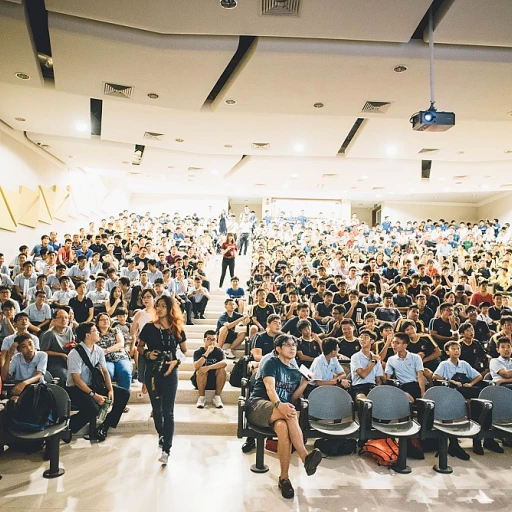Understanding Desk Sharing
What is Desk Sharing?
Desk sharing refers to the practice where office spaces are not assigned to a single employee but are instead allocated based on different work arrangements and needs. This flexible use of desks allows organizations to optimize their office space by embracing concepts like hot desking, desk hoteling, and other dynamic workstyles.
As companies transit into hybrid and flexible work environments, desk sharing has become a central component of workplace management. It involves employing a sharing policy where employees book desks as needed, rather than having a permanently assigned workspace. This system supports businesses by improving their office space utilization and accommodating the fluctuating presence of team members.
The shift towards desk sharing has been fueled by the evolution of hybrid work models where employees split their time between working remotely and in the office. As a result, resources are shared among a sharing ratio of employees who might not be present all at once. This approach becomes efficient through the use of advanced sharing software and a robust booking system, allowing for seamless desk management.
While desk sharing introduces a host of benefits, it also comes with challenges in implementation. Understanding these elements, as well as the supporting technological innovations, is crucial for organizations looking to embrace modern work environments and optimize their shared desk strategies. For more insights on how desk sharing fits into the broader context of business, you can explore the evolution of business applications and their role in the future of work.
Benefits of Desk Sharing
Advantages of Office Desk Sharing
In today's dynamic work environment, the benefits of desk sharing are becoming increasingly apparent. This approach allows employees to enjoy flexible work arrangements, accommodating their needs and boosting their productivity.
- Efficient Use of Office Space: With the advent of hybrid work models, not all employees are present in the office simultaneously. Shared desk arrangements help optimize office space by reducing the number of unused desks, ultimately lowering costs related to office real estate.
- Increased Interaction and Collaboration: Hot desking encourages team members to interact with different colleagues, which can lead to fresh ideas and greater team integration. This flexible work style fosters a culture of innovation and creativity within the workplace.
- Cost Savings: By implementing a sharing policy, companies can book desks more effectively and manage resources better, leading to reduced expenditure on office furniture and maintenance.
- Enhanced Employee Satisfaction: Flexible work arrangements often translate to happier employees, who appreciate the freedom to choose when and where they work. A well-implemented desk sharing system can contribute significantly to overall employee well-being.
To further support these benefits, companies may consider integrating a comprehensive desk booking system or sharing software, which helps in managing desk availability and monitoring real-time usage. Investing in such a system not only streamlines workplace management but also aligns with the evolving needs of the business world.
For more insights on how organizations are adapting to these trends, the role of effective move management in optimizing space can be explored
here.
Challenges and Solutions
Addressing the Complexities of Desk Sharing
In the evolving landscape of modern work environments, desk sharing presents its own set of challenges that organizations must navigate to maximize its potential. As companies transition to a hybrid work model, understanding these complexities is essential to fostering a productive and adaptable workplace.
Workplace management systems play a critical role in facilitating this transition. Companies often employ desk booking software to ensure that shared desk spaces are efficiently utilized. Implementing a robust booking system not only helps in managing shared spaces but also addresses logistical challenges such as the optimal desk availability, particularly in high-demand office spaces.
Yet, there are social and psychological concerns inherent to desk sharing. The shift from a designated desk to a hot desking environment may lead to discomfort among employees who value personal space and consistent interaction with their team members. A well-defined sharing policy, developed with input from employees, can help mitigate resistance by clearly outlining expectations and ensuring a fair and functional sharing ratio.
Shared desk environments can also impact employee productivity and well-being. There may be concerns over how flexible work can affect collaboration and communication within teams. Encouraging regular team meetings and utilizing digital tools for collaboration can help bridge gaps by promoting a sense of unity and shared purpose among team members.
Moreover, while the dynamic aspect of hot desking can invigorate the work environment by encouraging different team interactions, it requires thoughtful workplace management. Flexible work arrangements necessitate adequate support systems, such as storage facilities for personal items and hot desking etiquette guidelines.
Ultimately, the ability to address these challenges with innovative solutions not only enhances the office work experience but also paves the way for a resilient future of work. For more insights on how such systems can influence workplace functionality, explore
employment verification APIs in the future of work.
Impact on Employee Productivity and Well-being
Boosting Employee Engagement Through Desk Sharing
Desk sharing models in the contemporary office landscape are not only about optimizing space but also about positively impacting employee productivity and well-being. The introduction of shared desks and flexible work environments can create a more dynamic and engaging workplace, fostering collaboration among team members.
While the initial transition to a shared desk system may seem daunting, its potential to enhance productivity cannot be ignored. By allowing employees to collaborate across different teams, desk sharing facilitates idea exchange and cross-pollination of skills. This blending of talents and perspectives encourages innovation and invigorates the work dynamic, helping employees feel more intellectually stimulated and motivated.
However, for desk sharing to successfully enhance productivity, effective workplace management strategies must be implemented. Office space must be strategically arranged to optimize workflow, with appropriate desk booking systems in place to avoid confusion. These systems can help employees find optimal desks to match their immediate tasks, thereby enhancing efficiency.
Technological advancements play a pivotal role in overcoming the common challenges of hot desking and maintaining productivity in shared spaces. The use of software for desk booking and management ensures that employees can effortlessly book desks and focus on their tasks without the distraction of logistical issues.
Ultimately, the shared desk model aims to strike a balance between flexible work options and stable productivity. When implemented with a thoughtful approach, desk sharing policies can lead to a vibrant work environment that champions both employee satisfaction and organizational goals.
Technological Innovations Supporting Desk Sharing
Harnessing Technology for Desk Sharing Success
In today's dynamic work environment, technological innovations are invaluable for effective desk sharing. As office spaces continue to evolve with flexible work arrangements, technology plays a crucial role in managing the complex logistics of shared desks. Here's a look at some of the key technological advancements supporting this trend.
Firstly, desk booking systems have become essential. These systems allow employees to efficiently reserve desks according to their schedules, maximizing the usage of shared desks. Such systems often come with user-friendly interfaces and can integrate with existing hybrid work calendars to ensure seamless desk reservations.
Moreover, office management software assists in maintaining optimal desk utilization. With features that enable real-time monitoring of desk availability, these tools help in avoiding overbookings and maintaining a balanced sharing ratio. For teams embracing hybrid work models, this is particularly significant in coordinating seamless transitions between remote and in-office work days.
The use of smart workplace management tools further enhances the user experience. From apps that provide interactive office maps to notifications about available spaces, these innovations contribute to creating a more flexible work environment. Furthermore, some solutions incorporate IoT devices to monitor workspace occupancy, providing valuable data-driven insights to enhance the workplace.
Finally, organizations are adopting advanced sharing software solutions that provide comprehensive management of available office space. These platforms facilitate the implementation of effective sharing policies, ensuring that employees can book desks as needed while optimizing space allocation.
These technological advances collectively empower a more adaptive and efficient work environment, easing the challenges associated with desk sharing and hot desking. As businesses adopt these tools, they pave the way for more productive and satisfying work experiences for team members.
The Future of Desk Sharing
Envisioning the Future Landscape of Desk Utilization
In the rapidly evolving vocation environment, the concept of desk sharing is poised to continually transform the traditional setup of office space. As organizations increasingly embrace hybrid work models, the demand for a more adaptable and dynamic workplace continues to surge, driving innovative changes in how employees engage with their workspaces.
The adoption of flexible work arrangements, such as hot desking and desk hoteling, is reshaping how offices are utilized. In the future, shared desk systems will become more refined, with advanced desk booking software enhancing workplace management. This, in turn, will optimize how organizations manage their physical space, fostering a more efficient sharing ratio among team members.
As companies prioritize employee well-being and productivity, they will likely explore creative solutions to optimize the flexible work environment. The integration of smart technologies—such as IoT-enabled space management tools—will play a pivotal role in streamlining desk utilization and booking protocols. With these advancements, employees can seamlessly book desks and adapt to varying team needs, enhancing both individual focus and collaborative processes.
Ultimately, the future of desk sharing will hinge on a balanced approach that accommodates the diverse needs of employees while maximizing space efficiency. Collectively, these progressive strategies will ensure that shared desks not only meet practical requirements but also foster a work environment that prioritizes innovation, collaboration, and employee satisfaction. The sustained evolution of desk sharing will undoubtedly contribute to a more agile and responsive workforce, driving enhanced productivity and a more harmonious workplace dynamic.













